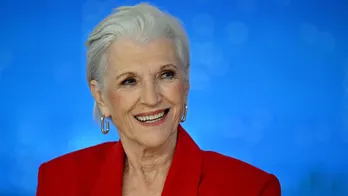Florida brain tumor patient plays guitar during his surgery: ‘This is wild’
The idea of having brain surgery while awake might seem amazing enough — but one Florida man took it a step further and played the guitar while doctors removed his tumor.
The neurological team from the Sylvester Comprehensive Cancer Center at the University of Miami Miller School of Medicine wanted the patient, Christian Nolen, to play notes on the instrument so they could evaluate and protect his manual dexterity while being as aggressive as possible in removing the tumor.
The surgeon and patient both spoke with Fox News Digital about the experience.
CALIFORNIA TEENAGER SINGS AGAIN AFTER HER RARE, COMPLEX AIRWAY SURGERY: ‘IT WAS LIFE-CHANGING’
Nolen, who is an avid guitar player, had a tumor on the right frontal lobe of his brain that was starting to cause symptoms.
"Christian was having issues with the left side of his body, particularly his left hand," Ricardo Komotar, M.D., director of the brain tumor program at Sylvester, told Fox News Digital via Zoom.
"He was noticing issues with his dexterity that affected his ability to play the guitar."

The neurological team from the Sylvester Comprehensive Cancer Center at the University of Miami Miller School of Medicine asked Christian Nolen to play guitar during his surgery so that they could evaluate and protect his manual dexterity. (Sylvester Comprehensive Cancer Center at the University of Miami Miller School of Medicine)
Nolen needed surgery to confirm the diagnosis and determine the type of tumor — as every tumor has different treatment options, Komotar noted — and also to remove as much of it as possible.
TEENAGE BRAIN CANCER PATIENT MISSES HOMECOMING, SO THE HOSPITAL THROWS A SURPRISE DANCE FOR HER
The surgery was scheduled for 10 days after the tumor was discovered — and Nolen was surprised when the doctors asked if he’d be willing to remain awake and play the guitar for the procedure.
"When a tumor is involving or near a critical part of the brain — something that controls the ability to speak or understand language or move — we want to do the surgery awake to continually monitor the patient, so you know if you start to violate normal brain functions," Komotar said.

Dr. Ricardo Komotar of Sylvester Comprehensive Cancer Center is director of the brain tumor program at the University of Miami Miller School of Medicine. (Sylvester Comprehensive Cancer Center at the University of Miami Miller School of Medicine)
When the patient is asleep, the doctor said, the surgery team doesn't have the ability to get feedback.
"The surgeries actually become much more dangerous because you can take out a tumor that involves normal brain function and cause real harm without knowing it," he said.
Given the importance of guitar-playing in Nolen’s quality of life, Komotar said there was "no better way" to monitor his manual dexterity and the effect of the tumor than to have him take up the instrument in the operating room.
NEW BLOOD PRESSURE PROCEDURE IS ‘GAME-CHANGING’ FOR PEOPLE WITH UNCONTROLLED HYPERTENSION, SAY DOCTORS
When the doctors posed the option to Nolen, he said that at first it "didn’t seem real."
"I’d only really heard of procedures of that nature being done in shows and movies," he told Fox News Digital in an email. "I felt like it was such a unique experience that I couldn’t pass up — especially with my motor skills being on the line."
He added, "The risk of being sedated for the entire procedure outweighed any fear or anxieties around the procedure itself."

Given the importance of guitar-playing in Nolen’s quality of life, his surgeon said there was "no better way" to monitor his manual dexterity and the effect of the tumor than to have him take up the instrument in the operating room. (Sylvester Comprehensive Cancer Center at the University of Miami Miller School of Medicine)
Prior to the procedure, Nolen said he was introduced to members of the surgical team and was told in-depth about what to expect.
The anesthesiology team put Nolen to sleep for the beginning of the open craniotomy, but he was awakened during a delicate part of the two-hour procedure. Once he was oriented on what was happening, the care team gave Nolen a guitar and asked him to play.
"Upon awakening, it was quite overwhelming to see everything around me and to fight the natural reaction to sit up," Nolen recalled.
"I felt like it was such a unique experience that I couldn’t pass up — especially with my motor skills being on the line."
After one of the members of the care team placed a "reassuring hand" to prevent Nolen from sitting up, he said it took only a second for him to remember what was happening.
"I just had to breathe and stay calm," he said.
During surgery, he tried his best to play through some of the songs he had been practicing, including tunes by artists like the Deftones and System of a Down.

Nolen had a tumor on the right frontal lobe of his brain that was starting to cause symptoms. (Sylvester Comprehensive Cancer Center at the University of Miami Miller School of Medicine)
As the surgeons removed the tumor, they continuously monitored Nolen’s hand function while he played the guitar.
"As we were finishing the case at the very back of the tumor, we noticed that his hand function started to decline," said Komotar. "The tumor was touching and interfacing with the part of the brain that controls hand movement. Fortunately, we were able to remove the entire tumor and not injure his hand."
"This is wild," Nolen said during the surgery.
What to know about awake procedures
While a patient playing guitar during surgery is not an everyday occurrence, Komotar told Fox News Digital that he and the rest of the specialized neurosurgical team perform awake surgeries several times a week, for a total of a couple of hundred times a year.
ONE FAMILY DONATES FOUR KIDNEYS TO SAVE A NEW YORK MAN’S LIFE: ‘DEFIED ALL ODDS’
"Most patients are intrigued by the process," he said. "We tell them that they’re going to be able to speak and move their hands or limbs so we can constantly examine them."
The doctors also reassure the patients that they won’t feel any pain, likely won’t remember the entire procedure, and will remain very comfortable — "which is the result of our world-class neuroanesthesia team," added Komotar.
Research has proven the benefits of doing procedures with awake anesthesia instead of deep general anesthesia, the doctor noted.

Prior to the procedure, Nolen was introduced to members of the surgical team and was told in-depth about what to expect. (Sylvester Comprehensive Cancer Center at the University of Miami Miller School of Medicine)
"Surgery with continuous neurological exam leads to better functional outcomes and fewer neurological deficits," he said.
There are also improvements in discharge and recovery.
"The less anesthesia you use during your procedure, the better the patient wakes up," he said. "The faster they wake up, the sooner they are up and walking around, and the sooner they go home."
Komotar added, "And inherently, the longer you're in the hospital, the more complications you have."
"Surgery with continuous neurological exam leads to better functional outcomes and fewer neurological deficits."
Guitar-playing isn’t the only activity that patients can do during an awake craniotomy.
Anything that doesn’t increase pressure in the head, such as playing the violin, is fair game, Komotar said.
Some patients sing during brain surgery, which allows the surgeon to monitor their ability to form and understand words as they remove tumors in areas that involve language.

Before awake surgeries, the doctors reassure patients that they won’t feel any pain, likely won’t remember the entire procedure, and will remain very comfortable. Nolen is shown at left; Dr. Ricardo Komotar is at right. (Sylvester Comprehensive Cancer Center at the University of Miami Miller School of Medicine)
There are some risks involved with awake cranial surgery, Komotar acknowledged.
"Seizures can definitely be worsened by doing awake surgery," he told Fox News Digital. "If someone has a history of seizures, we try to avoid electric brain stimulation, which is part of the technique."
The biggest risk of doing awake brain tumor removal is that about 5% to 10% of patients don’t "tolerate" being awakened, Komotar said.
STUDENTS USE AI TECHNOLOGY TO FIND NEW BRAIN TUMOR THERAPY TARGETS — WITH A GOAL OF FIGHTING DISEASE FASTER
"Even with world-class anesthesia, they might wake up either too startled or too in pain to be examined," he said. "They might be confused, agitated or unable to follow commands."
If that happens, the care team puts the patient back to sleep and proceeds with a more conservative tumor removal.
"He went home the day after surgery. He says his quality of life is better than it's ever been, so I think his recovery has been remarkable."
Without having continuous feedback from the patient, the surgical team can’t be as aggressive with the tumor removal, Komotar noted. "We only take out what we know is definitely safe, and we leave anything that's questionable."
The road to recovery
Nolen’s surgery went smoothly and the entire tumor was removed.
"Christian did terrific," Komotar said. "He went home the day after surgery. He says his quality of life is better than it's ever been, so I think his recovery has been remarkable."

"The team at Sylvester Comprehensive Cancer Center in Miami has been very informative and has not left much to the imagination in the best way possible," the patient said. (Sylvester Comprehensive Cancer Center at the University of Miami Miller School of Medicine)
The first couple of weeks after surgery were a little tough for Nolen, the patient said, mainly due to post-surgery restrictions.
"The days were really dragging," Nolen told Fox News Digital. "However, with a strong support system, I’ve been able to focus on the positives."
CLICK HERE TO SIGN UP FOR OUR HEALTH NEWSLETTER
He is now back to working out at the gym and playing the guitar, with significant improvement in his left hand.
"A case like this spotlights the value of multidisciplinary care."
He's awaiting the final pathology results, with follow-up treatment likely consisting of six weeks of radiation and chemotherapy.
Both Komotar and Nolen emphasized that the success of the surgery hinged on the collaboration of the entire care team.
"The team at Sylvester Comprehensive Cancer Center in Miami has been very informative and has not left much to the imagination in the best way possible," said Nolen. "They have also provided me with quite a few programs for emotional support."
CLICK HERE TO GET THE FOX NEWS APP
"A case like this spotlights the value of multidisciplinary care," added Komotar.
"It's not possible to remove a tumor like this and get the patient home so quickly and in such good health without an entire comprehensive team — neuro anesthesiologists, great intensive care specialists, nurses, techs, great oncologists — all working together."
For more Health articles, visit www.foxnews.com/health.
Disclaimer: The copyright of this article belongs to the original author. Reposting this article is solely for the purpose of information dissemination and does not constitute any investment advice. If there is any infringement, please contact us immediately. We will make corrections or deletions as necessary. Thank you.







